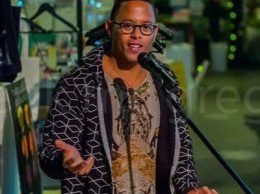The Onus of Black Respectability
By Terrion L. Williamson
Recently, I was reading a book about the lives of black women in America in which the authors recount the story of a woman identified as “Lucinda,” a well-to-do professional black woman living in the San Francisco area. The authors reveal how “devastated” Lucinda was when she was mistaken for a housekeeper by one of her white neighbors as she was waxing her car behind the luxurious high-rise apartment building where she lived.
I have heard stories of black people being mistaken for “the help” numerous times before, and often the reaction to these “slights” is anger and frustration by the offended party that the offending party (who is usually white) would dare to belittle her or him in such a way. This reaction comes as no particular surprise when one considers the heinous narratives of deviance and underachievement that African Americans have always had to fight and defend themselves against, and clearly the offensive notion that black people are fit for little else other than manual labor is but one by-product of a society built upon the unpaid labor and extinction of people of color. Consequently, many black people are understandably vigilant in warding off anything we perceive as attacking the credibility or memory of our myriad accomplishments, including our progress in obtaining upward mobility. A telling example of this impulse is the political brouhaha that ensued when then-presidential candidate Joe Biden described his then-rival Barack Obama as “clean” and “articulate” during the 2007 presidential campaign.
Yet, however understandable Lucinda’s reaction might have been, it alludes to a troubling attitude that permeates the discourse around black respectability—an attitude made all the more troubling because of the fact of President Obama. Now, while I appreciate that Lucinda wanted to be embraced as a full-fledged member of her community, and I will not deny that there may have been a discriminatory supposition being made by her white neighbor, lurking beneath Lucinda’s reaction was yet another discriminatory supposition: she felt her accomplishments should have shielded her from any affiliation with the multitudes of women who have used and continue to use domestic work as a means of economic survival. Essentially, Lucinda was offended not because she was being mistreated as a black woman, but because she was being mistaken for a certain type of black woman whose image did not jibe with the black empowerment success story she was attempting to cultivate for herself.
The aversion some black people have to certain other segments of the black population plays out in the implicit and explicit policing of the boundaries of the behavior deemed acceptable for “respectable” black people. To be sure, Lucinda may not have been making the argument that domestic work is itself an unacceptable field of work, but her “devastation” at being mistaken for a domestic worker suggests that the most valuable black citizens do not deign to do manual labor, and that those who do engage in such work for a living must have failed in some way.
Ultimately, one of the places where this policing of respectability happens most explicitly and forcefully is in the responses many black people have to representations of other black people that occur within the media. Case in point: since the ascent of Barack Obama, many black women have been clamoring over Michelle Obama, proclaiming her to be the long-awaited representative of black women the world has needed in order to recognize black female achievement. Don’t get me wrong. I get it. I have done some clamoring of my own. I am one of those persons whose regard of Barack Obama was bolstered as a consequence of his being married to Michelle Obama. Yet, what does it say when the representative par excellence of black women is an upper middle-class, ivy-league trained, heterosexual mother who sacrificed her own career in order to support her husband’s? For many I suppose it says exactly what they want it to say. But for those of us who are committed to the radical conceptualization of community as a space where the full diversity of black experience is welcomed, embraced, and valued regardless of religious or political affiliation, gender, sexuality, class standing, age, marital status, or physical or mental ability, the national arrival of Michelle Obama is as much a cause for concern as it is a cause for celebration.
And speaking of the media, perhaps the most angst producing site of cultural production for black people at the contemporary moment is the world of reality television. Every so often an article is published that attempts to make sense of the roles of black people, particularly black women, within the controversial genre that has become an indisputable mainstay of American television in recent years. Inevitably, what these articles and the comments they tend to invoke reveal is that many black people are still heavily invested in a brand of black respectability that, at best, favors heterosexual, two-parent middle-class family structures, and, at worst, is completely hostile to single mothers, LGBTQ people, the working poor, and just about anyone else who resists, intentionally or not, the normative constraints of upward mobility.
True enough, reality television and the images it produces can be very problematic, and it can be so for many groups of people—the character typologies reality television produces are seemingly endless. But I am concerned that in our ceaselessly reactionary disavowal of images of black people on reality television, as well as other media texts, we unwittingly produce the very thing we’re attempting to disavow. In our insistence on dismissing certain black folks as “ghetto” or “disgraceful” or “uncivilized,” or any number of other epithets, we serve only to create a category of people who can then be named as “ghetto,” “disgraceful” and “uncivilized.” This is not to suggest that we should just accept any and all images that are thrown at us without comment, but is to say we might benefit from taking a step back and examining our own biases that color the way we react to those images—as well as the people who we come into contact with every day who may inspire them.
____________________________________________________________
 Terrion L. Williamson is a doctoral candidate in the Department of American Studies and Ethnicity at the University of Southern California. She also holds a J.D. from the University of Illinois at Urbana-Champaign where she served as Executive Editor of theUniversity of Illinois Law Review. Her work moves between African American Studies, Gender Studies and Cultural Studies, with particular emphasis on black women in public and popular culture, religious media discourse, gendered violence, and legal constructions of deviance and outlawry.
Terrion L. Williamson is a doctoral candidate in the Department of American Studies and Ethnicity at the University of Southern California. She also holds a J.D. from the University of Illinois at Urbana-Champaign where she served as Executive Editor of theUniversity of Illinois Law Review. Her work moves between African American Studies, Gender Studies and Cultural Studies, with particular emphasis on black women in public and popular culture, religious media discourse, gendered violence, and legal constructions of deviance and outlawry.




Pingback: Tweets that mention The Onus of Black Respectability | The Feminist Wire -- Topsy.com